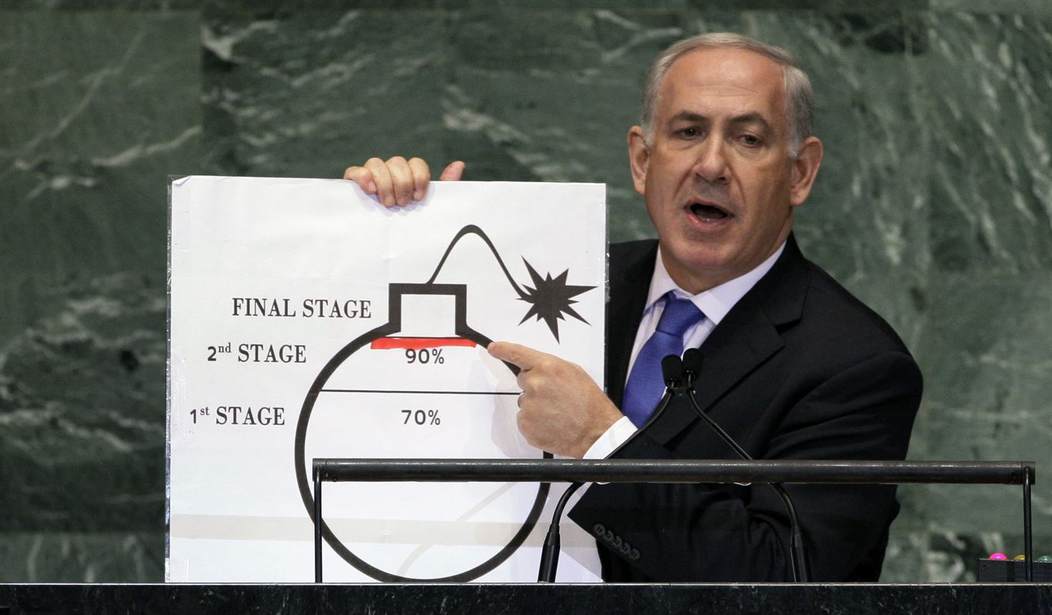Iran rejected the latest U.S. proposals for an agreement on its nuclear program. The U.S. demanded that Iran halt all enrichment activity in return for sanctions relief.
“To the American side and others, we say: Why are you interfering and trying to say whether Iran should have uranium enrichment or not? That’s none of your business,” Supreme Leader Ayatollah Ali Khamenei said on X.
Pay no attention to the mullah with the atomic bomb behind the curtain.
There have been five rounds of negotiations between Iran and the U.S., and very little progress has been made. With the recent release of the report by the International Atomic Energy Agency (IAEA) stating that Iran "had vastly increased its stockpile of highly enriched uranium (HEU), spinning up 50% more as of May 17 than they had previously reported. That translates into the capability to construct up to nine nuclear bombs." As I wrote on June 1, the pressure on Iran to come to an agreement is becoming intense.
The week before Memorial Day, it was widely reported that Israel was preparing a strike on Iran's nuclear infrastructure, only to be warned off by Donald Trump. Those Israeli military assets are still in position, awaiting a "Go" code.
The U.S. proposal for a regional nuclear enrichment consortium of nations, perhaps based in Iran, was not rejected outright by the Iranians.
The regional enrichment consortium is a key element in the proposal White House envoy Steve Witkoff gave Iran on Saturday. It's an attempt to reconcile President Trump's position that Iran can't be allowed to enrich uranium and Tehran's insistence that enrichment on its soil must continue.
The intrigue: "If the consortium operates within the territory of Iran, it may warrant consideration. However, should it be based outside the borders of the country, it is certainly doomed to fail," the senior Iranian official told Axios.
That response suggests Tehran may not outright reject Witkoff's offer, but instead seek to negotiate on the fine print.
"In theory, the consortium would include the U.S., Iran and countries like Saudi Arabia, the UAE, Qatar and even Turkey," reports Axios.
It would sell nuclear fuel (from an unnamed source) to countries that wish to build atomic programs for civilian use. IAEA inspectors would monitor the consortium's enrichment activities.
It's an intriguing idea that has far too many moving parts involving far too many countries. It might be an option after Iran stops enriching uranium completely, but Iran would never accept a consortium as a stopgap on the way to a deal.
Some Iranian officials have expressed openness to a consortium but have said any enrichment must continue in Iran and under its control. Iranian officials have long insisted Tehran’s enrichment program isn’t up for negotiations.
Trump said this week a new nuclear deal would preclude an enrichment program. That may not rule out an interim arrangement allowing some domestic enrichment by Iran.
Iranian officials have complained that Witkoff has refused to commit to specific sanctions relief, say Arab and Iranian officials.Oman, which is mediating between Iran and the U.S., has also suggested Iran halt some enrichment on a temporary basis in exchange for sanctions relief.
The offer for a nuclear enrichment consortium shows that Trump is doing everything he can to avoid a war with Iran. The multitude of unknown consequences and the way that large wars have a tendency to redraw maps and tangle alliances has Trump rightly hesitating.
But for Israel and the U.S., there is simply no alternative. Iran cannot be allowed to possess nuclear weapons, full stop, end of story. This has been U.S. policy (except for the eight years of the Obama administration) since the Iranian revolution in 1980.
Trump's predecessors all had it in their power to take out Iran's nuclear program before it went underground and inside a mountain. Now, only American "bunker-busting" ordnance and Israeli strike planes can end the threat.
Editor's Note: Thanks to President Trump and Defense Secretary Pete Hegseth's leadership, the warrior ethos is coming back to America's military.
Help us report on Trump and Hegesth's successes as they make our military great again. Join PJ Media VIP and use promo code FIGHT to get 60% off your membership.










Join the conversation as a VIP Member